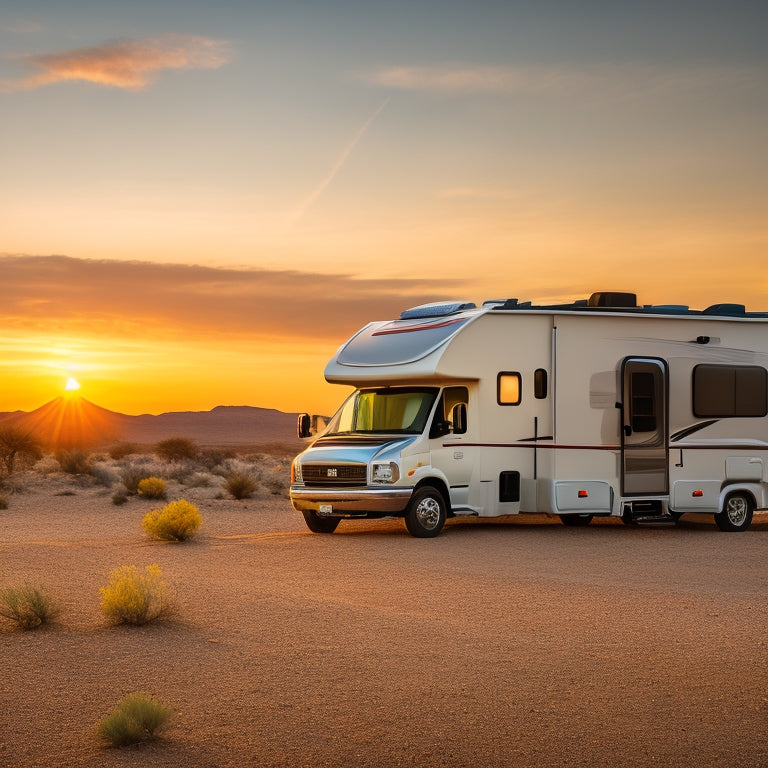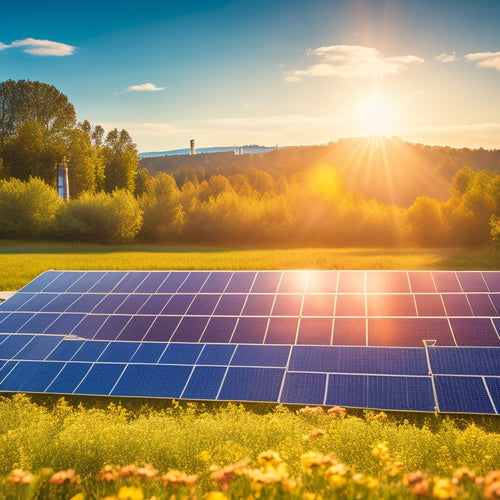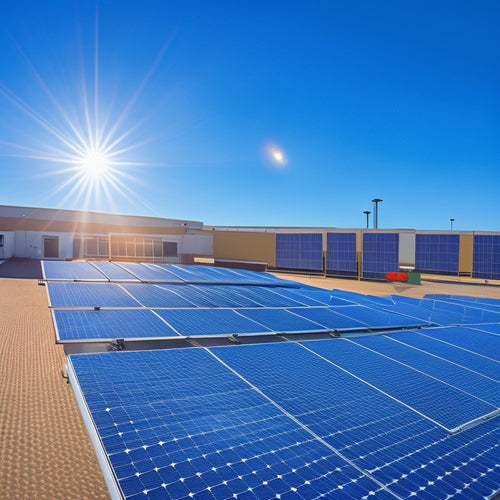
Rv Solar Power
Share
You're investing in RV solar power to break free from grid constraints and enjoy off-grid exploration without worrying about electrical hookups. With a reliable solar system, you'll have 24/7 energy availability, ensuring your batteries are always charged and ready to power your appliances. To maximize your energy harvest, consider your daily wattage needs by calculating the power consumption of essential appliances like LED lights, laptops, and refrigerators. Proper system design and maintenance are vital, including MPPT charge control and regular solar panel cleaning. As you optimize your RV solar power setup, you'll reveal the full potential of off-grid living, and uncover even more ways to enhance your freedom on the open road.
The Essentials
- RV solar power enables off-grid exploration without electrical hookups, providing consistent energy access for RV electrical systems.
- A reliable solar system design guarantees always-charged batteries, including solar panels, charge controllers, deep cycle batteries, and inverters.
- Daily energy management involves assessing appliance usage to determine power requirements, ensuring energy independence and efficient RV operation.
- Regular solar panel maintenance, smart battery charging, and advanced battery management are crucial for peak system efficiency and extended battery lifespan.
- Maximizing solar panel output through optimal installation and high-efficiency panels contributes to energy independence and enhances RV experiences.
Freedom From Grid Constraints
You're no longer tied to campsites with electrical hookups, as RV solar power gives you the freedom to venture off-grid without worrying about running out of power.
With a reliable solar power system, you can solve three major problems: limited energy access, increased fuel costs, and carbon footprint concerns renewable energy source.
You can unplug from the grid's constraints, exploring remote areas and enjoying the tranquility of nature without the hum of generators or the search for electrical outlets.
With a reliable solar power system, you're ready to set out on an off-grid journey, unencumbered by the limitations of traditional power sources.
Off-Grid Adventure Awaits
The open road stretches out before you, promising an escapade untethered from the constraints of grid power. With your RV solar power system, you're free to roam wherever the wind takes you, without worrying about finding a power hookup.
Regular solar panel maintenance guarantees your system operates at peak efficiency, while battery storage options like deep-cycle batteries and lithium-ion batteries provide the energy storage you need.
A camper solar panel kit off-grid camping escapades can be a great investment for those who want to travel freely, and portable solar kits and energy efficient appliances further minimize your energy requirements.
When selecting an inverter, consider your power needs and opt for a pure sine wave inverter for sensitive electronics.
While solar installation costs may seem steep, the long-term benefits of renewable energy and eco-friendly camping outweigh the upfront investment.
Embracing minimalistic living and off-grid cooking solutions like portable stoves and solar ovens, you'll find that life on the road isn't only possible but liberating.
Unplug From Worry
Beyond the boundaries of traditional campgrounds, freedom from grid constraints awaits, where the only schedule is the sun's daily rise and set.
You're no longer bound by the limitations of traditional RVing, where hookups and generators dictate your itinerary. With RV solar power, you're in control.
By investing in solar panel maintenance, you guarantee your system operates at peak efficiency. Energy storage solutions, like deep-cycle batteries, provide the power you need when the sun dips below the horizon.
To avoid the frustration of relying on a single, underpowered battery, consider upgrading to a high-quality RV battery bank, such as a RV lithium battery bank. This will help you solve critical problems like inconsistent power supply, extended downtime for recharging, and premature wear on your appliances.
Battery life optimization techniques, such as monitoring your state of charge, help you get the most out of your batteries. Inverter selection tips, like choosing the right size and type, assure you can power your appliances efficiently.
While solar installation costs may seem intimidating, renewable energy incentives and the freedom to roam untethered make it a worthwhile investment.
Portable solar options and energy-efficient appliances further increase your independence.
With RV solar power, you're free to unplug from worry and plug into the experience of a lifetime.
Silent Power on Demand
You can access energy when you need it with RV solar power, which provides reliable power anywhere. This means you can boondock without worrying about running out of power, as your solar panels will silently recharge your batteries on demand.
With a well-designed off-grid solar battery system, you can store excess energy for later use. A high-quality deep cycle battery, such as those from Renogy, can provide a reliable source of power when you need it most.
With a well-designed solar power system, you'll have the freedom to camp wherever you want, whenever you want.
Energy When You Need
Twenty-four hours a day, your RV's electrical systems are ready to spring into action, thanks to the silent power on demand provided by your solar power system. You can rest confident that your energy needs are met whenever you need them, whether you're camping in the wilderness or parked in a quiet suburban neighborhood.
With the right combination of solar panel types and energy storage solutions, you can enjoy the freedom to roam without worrying about running out of power. Here's a breakdown of how it works:
| Component | Function |
|---|---|
| Solar Panels | Convert sunlight into electrical energy |
| Charge Controller | Regulates energy flow to batteries |
| Deep Cycle Batteries | Stores excess energy for later use |
| Inverter/Converter | Provides AC power for appliances |
Your solar power system guarantees that your batteries are always charged and ready to provide power when you need it, silently and efficiently. Whether you're running lights, refrigerators, or laptops, you can trust that your energy needs will be met, giving you the freedom to focus on what matters most – enjoying the open road.
Reliable Power Anywhere
Solar power systems enable you to tap into a reliable source of energy, whenever and wherever you need it. With portable solar panel types, you can utilize the sun's power on the go, and enjoy silent power on demand.
When choosing a portable system, consider the installation tips: guarantee a secure and watertight mounting, and optimize panel angle for maximum energy collection.
Proper maintenance practices, such as regular cleaning and inspection, will help extend the battery lifespan and overall system performance. Inverter options like pure sine wave and modified sine wave inverters cater to different power needs.
Energy storage solutions, like deep cycle batteries, provide a backup during periods of low sunlight. By opting for solar power, you'll reap environmental benefits, reducing your carbon footprint and dependence on fossil fuels.
Before investing, conduct a cost analysis to determine the best setup for your needs. If you're handy, consider a DIY setup, but be certain to follow safety guidelines and local regulations.
With the right system, you'll enjoy reliable power anywhere, anytime, and experience the freedom that comes with it.
Efficient MPPT Charge Control
When you're relying on RV solar power, efficient MPPT charge control is essential to maximize your energy harvest.
Achieving off-grid energy independence and utilizing renewable energy systems can greatly enhance your overall experience.
You'll want to optimize your system for max power harvesting, ensuring that your solar panels produce the most energy possible.
Max Power Harvesting
Optimize your RV's solar power system by utilizing max power harvesting, an advanced technology that guarantees efficient energy collection. By maximizing your solar panel efficiency, you can generate more power and reduce your reliance on traditional energy sources.
To achieve this, it's essential to evaluate ideal installation angles, considering seasonal sunlight variations to guarantee consistent energy generation. When designing your off-grid system, select the right solar inverter type that suits your energy storage solutions.
Remember to follow solar power regulations and take advantage of renewable energy incentives to make your system more cost-effective. Regularly monitor your energy production and consumption using energy monitoring tools to identify areas for improvement.
Smart Battery Charging
Your RV's battery is the heart of its solar power system, and smart battery charging is vital to guarantee it operates efficiently. To achieve this, you need a sophisticated solar battery technology that integrates smart charging systems, advanced battery management, and energy storage solutions.
This makes sure your solar panels are compatible with your battery, and charge optimization strategies are employed to maximize energy harvesting.
A smart charging system like MPPT (Maximum Power Point Tracking) enables your RV's solar panel to operate at its maximum potential, while also protecting your battery from overcharging or undercharging. This results in improved battery lifecycle management, reduced maintenance, and increased overall system reliability.
Additionally, load balancing techniques and power monitoring tools help you keep tabs on your energy usage, making certain you're always connected to the grid when needed.
Consider Your Daily Wattage
You'll need to assess your energy-using habits to determine how much power you require daily. This involves calculating your wattage needs based on the devices you'll be running, from laptops and lights to refrigerators and air conditioners.
For instance, if you plan to use your RV for extended periods, you may need to contemplate a more sturdy off-grid power experience that can support your daily energy needs.
Additionally, having a reliable solar panel system can also reduce your reliance on camping generators(https://www.illchanterthistlater.com). By understanding your daily wattage requirements, you can size your solar panel system accurately.
Energy-Using Habits Matter
When it comes to RV solar power, an essential aspect to take into account is the daily energy expenditure of your appliances and devices. Your energy-using habits play a significant role in determining the size and type of solar power system you need. By adopting energy-efficient practices, you can reduce your energy consumption and make the most of your solar power system.
To achieve energy efficiency, you need to assess your daily energy usage. Take stock of the appliances and devices you use regularly, and their respective power consumption. Here's a breakdown of some common RV appliances and their approximate power consumption:
| Appliance/Device | Power Consumption (Watts) | Usage Hours/Day |
|---|---|---|
| LED Light | 5-10 | 8-10 |
| Laptop | 65-100 | 4-6 |
| Refrigerator | 100-200 | 24 |
| Water Pump | 50-100 | 1-2 |
| TV | 50-150 | 4-6 |
Calculate Your Wattage Needs
To determine the suitable solar power system for your RV, calculating your daily wattage needs is the next step. This calculation will help you decide on the right solar panel types and battery capacity for your energy requirements.
Start by making a list of your essential appliances and devices, along with their respective wattage ratings. Consider the number of hours you use each device daily. Multiply the wattage by the usage hours to get the total daily wattage for each appliance.
Add up the total daily wattage for all appliances to get your total daily wattage needs. For example, if you use a 20-watt laptop for 4 hours a day, your daily wattage need for the laptop is 80 watts.
Repeat this calculation for all your appliances, including lights, refrigerators, and charging devices. Don't forget to account for any power-hungry devices like air conditioning or hair dryers.
Higher Energy Harvest Rate
You'll want to maximize your solar panel's output to achieve a higher energy harvest rate.
This means ensuring your panels are installed at the ideal angle and orientation to capture the most sunlight.
Maximize Panel Output
Maximizing your RV's solar panel system requires careful attention to increasing panel output, as this directly correlates to a higher energy harvest rate.
You'll want to verify your panels are positioned for peak energy collection. This means adjusting the panel orientation to match the sun's movement throughout the day. A south-facing orientation with a slight tilt (around 30-40 degrees) is usually ideal, but you may need to adjust based on your location and the time of year.
Additionally, consider the solar efficiency of your panels. High-efficiency panels can generate more power per hour of sunlight, making them a worthwhile investment.
You can also enhance output by keeping your panels clean and free of debris. Dirt, dust, and other obstructions can reduce energy production by up to 25%, so regular cleaning is crucial.
Frequently Asked Questions
Can I Use RV Solar Power With My Existing Electrical System?
You can integrate alternative energy with your existing electrical system by installing a power inverter, ensuring energy efficiency and minimizing modifications, allowing you to capture free energy and enjoy the freedom to roam without grid dependence.
How Do I Clean and Maintain My Solar Panels Effectively?
You'll maximize solar efficiency by cleaning your panels regularly, as dirt impact reduces energy output. Follow these maintenance tips: inspect panels monthly, clean with distilled water and a soft brush, and avoid harsh chemicals to guarantee peak performance and freedom from energy constraints.
Are RV Solar Panels Compatible With Lithium-Ion Batteries?
You'll be relieved to know that lithium-ion batteries are compatible with solar panels, as they don't require a specific battery type; however, you'll want to guarantee your solar panel's efficiency isn't compromised by the battery's charging characteristics.
Can I Add More Solar Panels to My Existing System Later?
As you chart your expedition towards energy independence, you'll be thrilled to know that you can indeed add more solar panels to your existing system later, ensuring seamless system expansion and solar panel compatibility for a worry-free quest.
Do RV Solar Panels Work on Cloudy or Rainy Days?
On cloudy or rainy days, you'll notice a decrease in energy production, as solar panels' cloudy performance and rainy efficiency are lower; however, they still generate some power, and you can optimize your system to minimize the impact of inclement weather.
Final Thoughts
You've finally broken free from the shackles of grid dependence, and now you're basking in the glorious silence of solar power. But don't get too comfortable - you still need to crunch some numbers to guarantee your RV's energy needs are met. Remember, it's not just about slapping some panels on the roof; it's about optimizing your system for maximum efficiency. So, go ahead, indulge in your newfound freedom, but don't forget to do your math homework.
Related Posts
-

Top Portable Refrigerators for Camping Adventures
When you're camping, having a reliable portable refrigerator can make all the difference for keeping your food fresh ...
-

Advantages of Solar Generating Systems Over Traditional Energy
Solar generating systems provide several key advantages over traditional energy sources. You'll experience lower long...
-

Essential Solar Panel Mounts for Commercial Properties
When it comes to essential solar panel mounts for your commercial property, durability and wind resistance are key fa...


